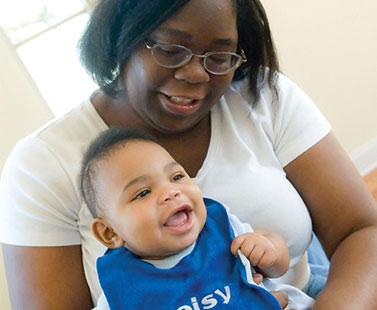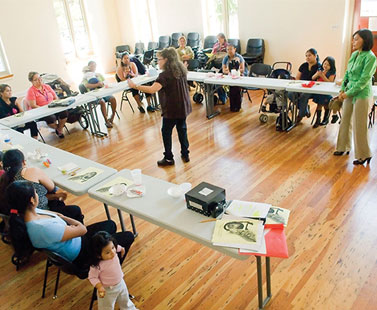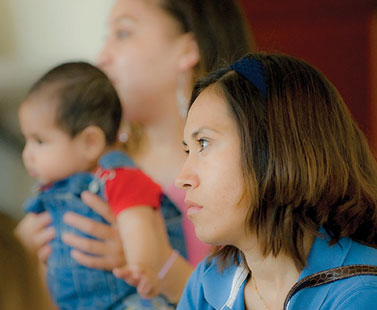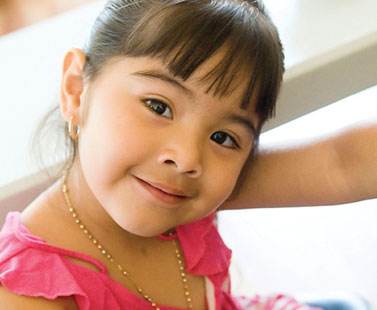Program offers at-risk moms and babies a healthy start

Healthy Start mother Selena Scott went to Capitol Hill recently to advocate for the USF COPH administered program, which aims to lower infant mortality rates in Central Florida.
Some might see Selena Scott as an unemployed single mother living in one of Tampa’s poorest neighborhoods.
But she is more than that.
Scott, 35, is determined to be the best mother to her son, 8-month-old Jayden, that she can be.
And so she is transforming herself into a community activist with the help of a program that assists mothers and babies: the Central Hillsborough Healthy Start Project. Administered by USF, the federally funded program aims to lower infant mortality rates in Central Tampa.
Scott stood in front of a group of other Healthy Start mothers on a recent morning and told them about her work advocating for Healthy Start – on Capitol Hill.
“It was a great visit,” she told the group. “They know it’s a wonderful program that helps moms and babies.”
She finished by urging any mothers who get the chance to speak out as well, and won a round of applause for her speech.
It’s that kind of grassroots leadership that Estrellita “Lo” Berry, project director, sees as a vital part of making Healthy Start successful.
“Not everybody gets it,” Berry says. “If you’re genuine about working with folks to make lifelong health changes, you’ve got to include them in the creation and delivery of services.”
Central Hillsborough Healthy Start, a project of the Lawton and Rhea Chiles Center for Healthy Mothers and Babies and USF’s College of Public Health, invites women to form “community councils” to help each other. Berry has brought community residents into focus groups to talk about how the program can do more. She has hired area residents onto her staff.
“You build capacity by educating and hiring from the community you serve,” she says. “They’re going to be passionate. They’re going to be invested.”
Scott’s investment stems from gratitude. Healthy Start nurses began helping her before Jayden was born. She developed gestational diabetes while she was pregnant, and Jayden arrived nearly three weeks early. They gave her advice on everything from putting Jayden to sleep on his back to help with breastfeeding.

Monthly support group meetings offer moms advice on medicine, child raising and more.
Scott now goes to support group meetings with other moms, relies on Healthy Start for advice about medicines and child-raising tips, and hopes to return to school to become a licensed child-care worker.
“You have a support network,” says Scott, sitting in her living room, shaking a rattle at Jayden. He laughs and grabs for it and grins. The room has been overtaken by Jayden’s toys. Winnie the Pooh sprawls on the coffee table and Jayden’s walker holds the place of honor.
Meanwhile, Berry hopes that the support network is helping to change some of the grim facts about babies in Central Tampa. Babies here are more than twice as likely to die during their first year of life than the average American baby. Healthy Start is attacking that rate with a variety of programs: home visits and support groups, Healthy Start Coalition activities, special projects targeting African-American babies, and a program for fathers.

Research shows the program is helping change some of the grim facts about babies in Central Tampa.

The project seems to be helping. USF researchers recently published an article in Maternal and Child Health Journal, showing that in the Central Tampa area, Healthy Start moms had a 30 percent lower rate of preterm births than mothers who didn’t receive services. The finding is important because reducing preterm births could also reduce infant mortality.
But for Berry, that’s not enough. Healthy Start’s $1.5 million budget serves 500 mothers annually, but 5,000 babies are born each year in their service area.
“We’re only seeing a drop in the bucket,” she says of Healthy Start’s work.
And so moms like Scott will keep working. Since Scott first got help from Healthy Start, she’s helped organize spaghetti dinners, clothing donations and other projects. If she sees a pregnant woman, she makes sure she knows about Healthy Start. She’s a believer.
“They have that personal relationship with you,” Scott says. “It’s not just about numbers and the caseloads. They’re part of my family now.”
– Story by Lisa Greene, USF Health Communications
– Photos by Eric Younghans, USF Health Communications
This article appeared in the Spring/Summer 2009 issue of USF Magazine.

